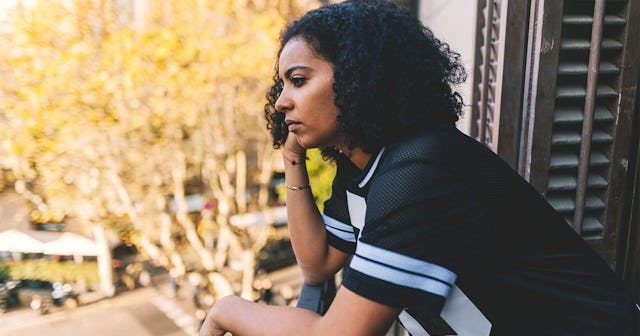America Places A Long List Of Burdens On The Black Community—Let's Address Them

We already know that COVID-19 hospitalizations and deaths are substantially higher among black communities than among whites. The CDC tells us so. There’s “an overrepresentation of blacks among hospitalized patients,” and death rates in New York City were “substantially higher” for black and Hispanic patients than for whites and Asians.
Part of this, they say, could be housing inequality: black people are more likely to live in densely populated areas “because of institutional racism in the form of residential housing segregation.” Black folks who live in areas considered “food deserts” often have less access to nutritious food. They’re more likely to work in essential industries. They’re less likely to have health care. They don’t have paid sick leave, so they go to work anyway. They also tend to have more serious underlying health conditions than white Americans, mostly for all of the reasons above. Not to mention that, as we’ve seen during the COVID-19 outbreak, blacks are still experiencing police brutality, higher joblessness, and unfairness in the mortgage industry.
COVID-19? Just one more major thing to worry about.
Police Brutality Hasn’t Stopped
As we’ve seen with the horrific footage of George Floyd’s death, and in the ensuing protests that have erupted throughout the country, police brutality hasn’t ended just because there’s a global pandemic going on.
This isn’t new; The Guardian notes that the mother of Eric Garner, killed in July 2014 in New York City when police put him in an illegal choke hold spoke out, saying that, “It’s painful but true that black lives continue to be destroyed by police officers in many communities across our country. They keep killing us. And it’s the same story again and again.” One more thing. One more life.
The National Academy of Sciences says that police shootings are now one of the leading causes of death among black men. One in every thousand will be killed by the police. COVID-19? Just one more thing.
Unemployment and Underemployment: One More Thing
We talk about how everyone’s working at home now with the COVID-19 outbreak, and everyone’s getting everything delivered. Nope. According to the Economic Policy Institute, less than one in five black workers, and one in six Latinx workers, are able to work from home. Dr. Keith Ferdinand, professor of medicine at Tulane University School of Medicine in New Orleans, told National Geographic that African Americans are more likely to work in service industries or “essential jobs.” These, we all know, are less likely to come with things like health benefits and sick leave. Waitresses don’t get health insurance. And they don’t get paid when they’re sick, either. Maya Rockeymoore Cummings, a former chairwoman of the Democratic Party of Maryland and candidate for the U.S. House of Representatives from Baltimore, tells National Geographic that blacks were either some of the first layoffs who are now unemployed and uninsured, or they’re now “essential workers” getting exposed to the virus.
Without access to good, well-paying jobs — because of the persistent educational inequalities in America, and systemic racism, one more thing holding back the black community, it’s hard to get good jobs. That leaves the black community stuck in an economic morass of the service industry and the gig economy: the people who can’t quit work during COVID-19.
One more thing.
Health Is Also One More Thing
Food deserts, which the Washington University Political Review call an “area in the United States with limited access to affordable and nutritious food” are predominantly found in minority areas. They’re the places where you can’t find a decent grocery store within walking distance, where people are forced to rely on places like convenience stores, bodegas, and Dollar Generals to buy their sustenance. Sound like one more thing? It is, and it’s a dangerous one. Food deserts lack access to things like fresh produce and lean meat, and if they’re there, they’re very expensive.
They can force minority communities into a less nutrient-rich diet, one higher in sodium, fat, and cholesterol than more affluent people’s: a diet that leaves black people vulnerable to a plethora of health struggles.
This one more thing? One more inequality? It has huge consequences. Dr. Ebony Hilton, associate professor of anesthesiology and critical care medicine at the University of Virginia, told National Geographic that blacks suffer from higher rates of “heart disease, stroke, cancer, influenza and pneumonia, diabetes, HIV disease, [and] kidney failure.” These underlying conditions make them more likely to die of COVID-19. Systemic inequalities in our health care system don’t help, either.
And They STILL Can’t Get a Mortgage
According to a study by The National Bureau of Economic Research, even with controlling for other considerations, black Americans are 105% more likely than white Americans to be given a high-cost mortgage. Race and ethnicity, in fact, were the two key factors that determined whether a borrower would be offered a high-cost mortgage.
So they often have to rent. This means they can’t pass the wealth and capital onto their kids, they can’t accrue wealth, and they can’t build up a nest egg the same way white families can. So while white families are working at the homes they own, black essential workers are going out into the world, risking illness, with no health insurance, from the houses and apartments they rent.
One more thing. One more thing that adds up to a hell of a lot of big things, that adds up to a lot of injustice that we can’t forget about. White America is sheltered from the burden we place on black America every day. It’s time we thought more about it. It’s time we seriously considered its consequences.
It’s time we did something about it.
This article was originally published on